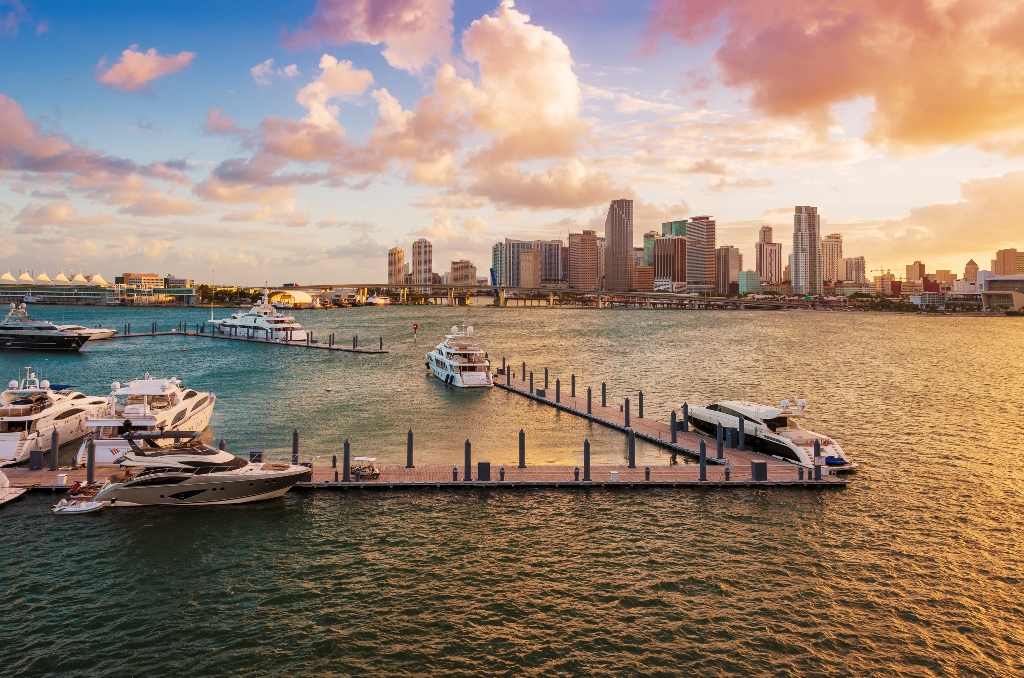Downtown Miami, Florida, USA, and the port, seen from MacArthur Causeway at sunset. Photo: Dreamframer/Shutterstock.com
Florida’s economy depends heavily on travel and tourism. We all know that. It’s a scary time right now to even think about it but in the long run, this pandemic will affect our travel and tourism industry more than we ever imagined. Not too badly, but Florida’s economy will see itself shaken to its core in the months following a lift on the stay-at-home orders and mass shutdowns throughout the state.
Things look dire all over for the hospitality industry right now. According to the latest data compiled by Visit Florida, hotel demand on March 22 was down 74.9% percent statewide from the same date in 2019, as compared to a national drop of 66.8%.
Hotels here, if they’re operating at all, are reportedly housing medical workers, permanent residents and guests in isolation due to the COVID-19 pandemic. The Florida Restaurant and Lodging Association’s CEO Carol Dover thanked Florida Governor Ron DeSantis last Thursday, April 9 for allowing restaurants to remain open for takeout when he issued his statewide “safer at home” order that took effect April 3.
In 2005, historian Gary Mormino said about Florida’s tourism industry in his survey of modern Florida, “Land of Sunshine, State of Dreams”: “Florida’s identification with travel is so entrenched that the Sunshine State is synonymous with tourism. In free-spending, class-bending, nation-mixing sprees of consumption, hordes of visitors descend upon Florida. … Contrast the democratized tourism of today with the tourism of nineteenth-century Victorian America, when only the wealthy could realize their dreams of winter paradise.”
The outlook on the Visit Florida website chart paints painful blows now hammering the tourism industry as of right now. There’s a light at the end of the tunnel, though. A Harris Poll at the end of March asked Americans when they might resume former activities after the pandemic ends. An impressive 66% said they would go out to dinner within three months, with 13% saying they would do it immediately. As for hotels, 37% expect a stay within three months, and 29% would fly on a plane.
Many Northerners who had or have plans to travel to Florida amid the coronavirus crisis (once it’s over, of course) say they have concerns about whether or not and when they may be able to travel again and if they can ever go to Florida once this is all over. Obviously that all depends on when their respective state(s) lift the stay-at-home orders, but one travel expert gives a general idea for when people can start seeing when things will start getting back to normal.
In a recent interview with the New York Times, Lori Pennington-Gray, director of the Tourism Crisis Management Initiative at the University of Florida, discusses travel anxiety in 2020, and who and how and why are the people that have it and what people can expect after fear and stress from the coronavirus pandemic dies down.
Pennington-Gray remarked that regardless of whatever crises she has worked with, people always ask the same kind of question: When do you know when the crisis is over? She says we will get our answer as we will have some markers along the way that will let us know little by little that start to signal the crisis is over. But the travel expert advises travelers that different destinations have their particular different stage of the crisis wave than other destinations. It is important to her that travelers know to monitor at a global level the latest news along with their local news, of course. The information will help them determine what they need to be doing at what stage to be able to prepare to bring people back, she stated.
Pennington-Gray also noted that as far as the travel and tourism industry, one of the things that we’ve seen from crises in general is that the industry is very resilient, and that we rebound fairly quickly. People will be eager to travel after being in isolation for the last two months (maybe more). There’s some indication that travel will be limited to driving tourism at first. Then as time goes on and tensions ease about the virus people will start feeling more comfortable and will be shortly jumping on a plane and traveling to other countries.
Florida has always been a destination where people come to vacation and get away from the mundaneness of everyday life. Florida residents themselves would like to forget all this and put it behind them, for sure. It seems far away right now, but it might come about sooner than we think. Unlike a hurricane, the invisible danger that is COVID-19 will leave our buildings and attractions intact. Florida will be an oyster ready for the taking once the world is allowed to go out again. We are ready for the next best thing that will make Florida the ideal place to visit and vacation at for years to come.
Melissa’s career in writing started more than 20 years ago. Today, she lives in South Florida with her husband and two boys.

